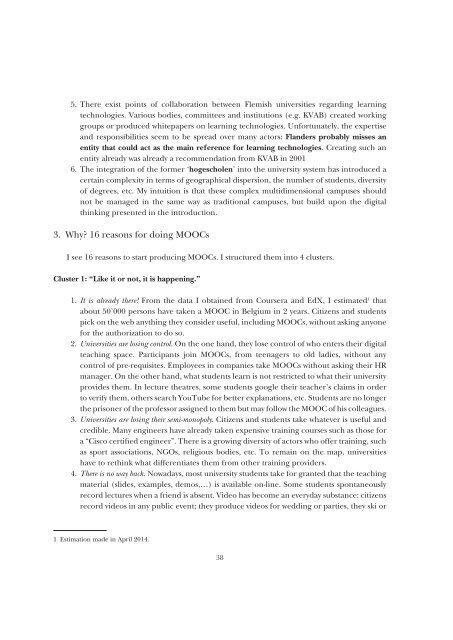Dillenbourg Higher education in the digital era
tw_blended-learning_en
tw_blended-learning_en
You also want an ePaper? Increase the reach of your titles
YUMPU automatically turns print PDFs into web optimized ePapers that Google loves.
cycle with a cam<strong>era</strong> on <strong>the</strong>ir body, etc. I expect that, very soon, our students will compla<strong>in</strong><br />
if <strong>the</strong> videos of a course are not available somewhere. The current format of MOOCs may<br />
disappear, but <strong>the</strong> ubiquity of videos -<strong>in</strong> diverse forms- is only <strong>in</strong> its <strong>in</strong>fancy. Video has<br />
become an everyday substance.<br />
Story. DuoL<strong>in</strong>guo is a language learn<strong>in</strong>g platform that attracted 38 millions participants<br />
<strong>in</strong> two years. It proposes simple language learn<strong>in</strong>g activities. Access is be<strong>in</strong>g entirely<br />
free. What is strik<strong>in</strong>g is <strong>the</strong>ir f<strong>in</strong>ancial model, which breaks away from any academic<br />
idea. The company uses crowdsourc<strong>in</strong>g to translate <strong>in</strong>to many languages <strong>the</strong> texts<br />
produced by o<strong>the</strong>r companies, such as CNN: <strong>the</strong> learners receive sentences to translate,<br />
beg<strong>in</strong>ners translat<strong>in</strong>g simple sentences and advanced students translat<strong>in</strong>g more<br />
complex ones. The quality of <strong>the</strong>ir translation can be checked s<strong>in</strong>ce sev<strong>era</strong>l thousands<br />
of <strong>the</strong>m may be translat<strong>in</strong>g <strong>the</strong> same sentence. Us<strong>in</strong>g crowdsourc<strong>in</strong>g to f<strong>in</strong>ance<br />
<strong>education</strong> maybe shock<strong>in</strong>g from a Humboldt perspective, but this approach illustrates<br />
how far <strong>digital</strong> <strong>education</strong> may be different from <strong>the</strong> way we th<strong>in</strong>k our university<br />
teach<strong>in</strong>g.<br />
Cluster 2: “Better be an actor than a spectator!”<br />
5. MOOCs tickle <strong>the</strong> academic landscape. In <strong>the</strong> US, <strong>the</strong> rise of MOOCs cannot be disassociated<br />
from <strong>the</strong> f<strong>in</strong>ancial crisis of universities and from <strong>the</strong> huge debt that students accumulate<br />
dur<strong>in</strong>g <strong>the</strong>ir studies. In Europe, MOOCs tickle <strong>the</strong> relationship between universities. On<br />
<strong>the</strong> one hand, <strong>the</strong>y <strong>in</strong>crease competition between universities by lett<strong>in</strong>g universities “fish”<br />
on remote territories. On <strong>the</strong> o<strong>the</strong>r hand, <strong>the</strong>y facilitate collaboration between universities<br />
that can more easily than before build jo<strong>in</strong>t curricula.<br />
6. MOOCs may kill small universities. MOOCs re-activate <strong>the</strong> debate between large and small<br />
universities, between research universities and teach<strong>in</strong>g universities, etc. This question is<br />
not bound to MOOCs, but some scholars argue that small universities might disappear<br />
s<strong>in</strong>ce successful MOOCs orig<strong>in</strong>ate mostly from top universities. In contrast, small<br />
universities might benefit from MOOCs by giv<strong>in</strong>g a professor a worldwide visibility that he<br />
could not o<strong>the</strong>rwise get from <strong>the</strong> reputation of his or her university. I don’t know which<br />
of <strong>the</strong>se two predictions is correct and how <strong>the</strong> European academic landscape will evolve<br />
<strong>in</strong> <strong>the</strong> next decade, but I am conv<strong>in</strong>ced that MOOCs will be one of <strong>the</strong> ma<strong>in</strong> factors of this<br />
evolution.<br />
7. Risk is an academic duty. The previous po<strong>in</strong>t acknowledges that MOOCs constitute some<br />
risk for academia. Risks concern <strong>the</strong> f<strong>in</strong>ancial impact of MOOC but also data privacy and<br />
<strong>in</strong>tellectual property, etc. It is legitimate to estimate <strong>the</strong>se risks before decid<strong>in</strong>g to engage<br />
or not <strong>in</strong> MOOCs. However, <strong>the</strong> future is not foreseeable: <strong>the</strong> MOOCs of tomorrow do<br />
not exist; <strong>the</strong>y will be what universities collectively <strong>in</strong>vent. If universities are not will<strong>in</strong>g to<br />
39


